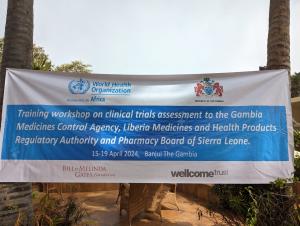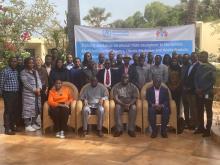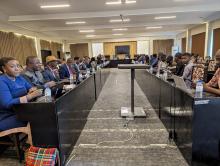WHO Spearheads Groundbreaking Workshop to Advance Clinical Trial Oversight in West Africa
Banjul, The Gambia - In a landmark initiative aimed at bolstering healthcare infrastructure and regulatory capacity in West Africa, the WHO country offices in The Gambia recently convened a groundbreaking workshop on clinical trial assessment for the Medicines Control Agency (MCA) of The Gambia, Liberia's Medicines and Health Products Regulatory Authority, and Sierra Leone's Pharmacy Board. Held from April 15th to 19th, 2024, this collaborative effort represents a significant step forward in strengthening regulatory oversight and advancing public health objectives across the region.
At the heart of this transformative workshop is the African Vaccine Regulatory Forum (AVAREF), a capacity-building network established by WHO in 2006 to enhance ethics and regulatory oversight of clinical trials in Africa. Over the years, AVAREF has played a pivotal role in harmonizing regulatory standards, accelerating vaccine reviews, and promoting equitable access to life-saving medical products. By fostering collaboration among national regulatory authorities and ethics committees, AVAREF has catalyzed a paradigm shift in the regulatory landscape, laying the groundwork for enhanced clinical trial oversight and accelerated product approvals.
The workshop, facilitated by WHO in collaboration with AVAREF, is part of a broader strategy to strengthen regulatory capacities and streamline clinical trial processes in low- and middle-income countries. Drawing upon WHO's extensive expertise in public health and regulatory affairs, the workshop provided participants with comprehensive training on clinical trial assessment, regulatory compliance, and ethical review processes. Through a combination of interactive sessions, case studies, and expert presentations, participants gained invaluable insights into the intricacies of clinical trial oversight, equipping them with the knowledge and skills needed to navigate the complexities of regulatory decision-making.
The success of this landmark event was made possible through generous funding from esteemed partners such as the Wellcome Trust and the Bill & Melinda Gates Foundation. Their unwavering commitment to global health equity and innovation has played a pivotal role in supporting initiatives aimed at strengthening clinical trial assessment and regulatory oversight in Africa. By providing critical financial support, the Wellcome Trust and the Gates Foundation have empowered organizations like AVAREF to expand their reach, deepen their impact, and drive progress towards achieving universal access to life-saving medicines and vaccines. Their visionary leadership underscores the importance of collaborative partnerships in addressing complex health challenges and underscores their shared commitment to advancing the health and well-being of all people, particularly those in underserved communities.
The impact of this workshop extends far beyond the confines of regulatory affairs, encompassing broader implications for public health resilience and pandemic preparedness. In the wake of the ongoing COVID-19 pandemic and the looming threat of future health emergencies, the need for robust clinical trial oversight mechanisms has never been more urgent. By strengthening the regulatory capacities of The Gambia, Liberia, and Sierra Leone, the workshop has bolstered the region's readiness to respond to emerging health threats, facilitating the rapid evaluation and deployment of vaccines, therapies, and diagnostics in times of crisis.
In the African continent, the burden of Vaccine Preventable Diseases (VPDs) casts a long shadow over the health landscape, with an estimated 500,000 children under the age of 5 succumbing to these diseases each year. This staggering toll underscores the urgent need for innovative solutions and access to life-saving medicines and vaccines. However, realizing this goal requires more than just scientific breakthroughs—it demands the establishment of a robust clinical trial ecosystem that can efficiently evaluate, approve, and deploy new medical interventions.
At the heart of this endeavor lies the imperative of regulatory harmonization and effectiveness. By aligning regulatory standards and streamlining approval processes, countries can accelerate the introduction of new medicines and vaccines while upholding the highest standards of safety and efficacy. Timely regulatory decisions are critical in addressing public health emergencies and ensuring that vulnerable populations receive timely access to life-saving interventions.
Moreover, the workshop aligns seamlessly with WHO's overarching mission to promote health equity, strengthen health systems, and advance universal health coverage. By empowering national regulatory authorities to conduct comprehensive assessments of clinical trials, WHO is paving the way for improved access to essential medicines, mitigating the burden of vaccine-preventable diseases, and enhancing health outcomes for millions of individuals across the region. Furthermore, the workshop underscores WHO's unwavering commitment to fostering partnerships and driving collective action towards shared health goals, reaffirming its role as a global leader in public health advocacy and capacity-building.
Looking ahead, the workshop's legacy will endure through sustained efforts to monitor safety during clinical trials, strengthen systems for the licensure of new products, and implement robust post-marketing surveillance mechanisms. By building upon the foundation laid during the workshop, The Gambia, Liberia, and Sierra Leone are poised to emerge as trailblazers in clinical trial oversight, setting a precedent for other nations in the region and beyond. As WHO continues to champion the cause of health equity and resilience, the workshop serves as a testament to the organization's unwavering commitment to ensuring that every individual has access to quality healthcare, regardless of their geographical location or socio-economic status.
By harnessing the collective expertise and commitment of stakeholders across the region, WHO has catalyzed a transformative shift towards a future where health equity, innovation, and resilience reign supreme. As The Gambia, Liberia, and Sierra Leone embark on this journey of progress and transformation, WHO stands ready to offer unwavering support and guidance every step of the way. Together, we can build a healthier, more resilient future for all.





